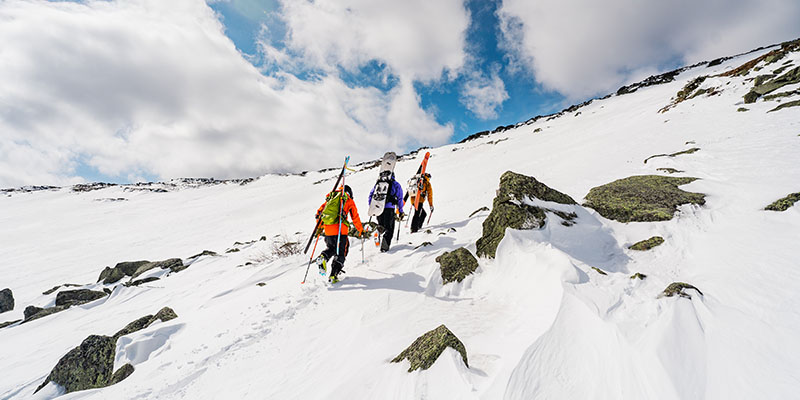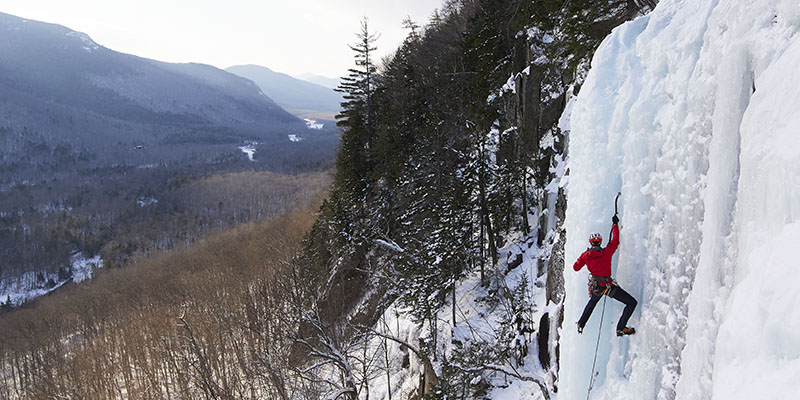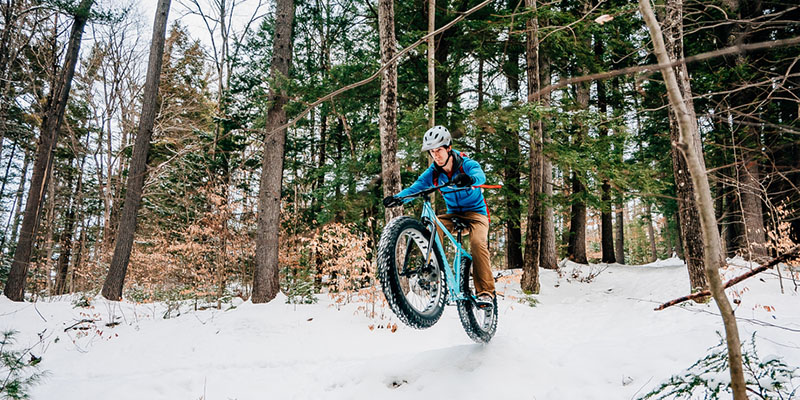For those who seek out the undiscovered side of New Hampshire’s landscapes: epic adventures off the beaten path hide around every corner of the state. Whether you want to blaze your own trail down steep mountain peaks beyond the resorts, scale a frozen cascade of glistening ice, or skin your way
up a mountain, New Hampshire’s playground of diverse landscapes is the best place to do it. No matter which adventure you choose, always be sure to check the
recreation forecast and prepare accordingly for all conditions.
Uphill and Backcountry Skiing

For some skiing is a fun winter pastime, but to others it’s a serious sport and a daring way to stay in shape during the long winter months. Wherever you fall on the spectrum, if you’re interested in backcountry skiing there are skills you need to know before challenging an epic mountain on your own. The season for backcountry skiing in the White Mountains generally starts in early February through mid-March for winter conditions, and mid-March through mid-April for spring conditions. Be sure to keep an eye on the forecast and seasonal weather trends before making winter plans.
Local Resources
Local organizations like the
NH AMC and the
Granite Backcountry Alliance offer more information and resources on how and where you can shred up the glades in the backcountry. While many ski resorts are embracing uphill skiing, each has its own set of guidelines so be sure to check out SkiNH’s list of
uphill skiing resort policies before climbing your favorite ski mountain.
Avalanche Safety
If you plan to ski on terrain beyond the state’s groomed and maintained mountains, you need to be aware of the risks and how to manage them. According to
Avalanche.org, avalanches (a.k.a. giant masses of loosened snow that tumble down steep slopes) are responsible for killing 25-30 people and injuring many more in the U.S. each winter; and New Hampshire’s White Mountains can be prone to them. Always
check current conditions and avalanche risk levels at your destination to know before you go.
Guides
The best way to safely traverse New Hampshire’s towering peaks and winter terrain is by hiring a local expert who knows the ins and outs of the sport or partaking in a guided class. Guides like
Blue Ridge Mountain Guides,
Northeast Mountaineering,
Redline Guiding,
Synnott Mountain Guides are ready to lead you through a variety of destinations throughout the state. If you’re newer to the sport, consider an introductory class like those offered by the
NH AMC or
Bretton Woods.
Ice Climbing

Bold recreationists have carved a sport out of conquering frozen ice cascading down steep cliffs in a form known as ice climbing. The sport has risen in popularity over the years, and more and more folks are descending on New Hampshire’s frozen hotspots to scale icy waterfalls come late January through early March. While ice climbing poses definite risks, it doesn’t have to be dangerous.
Local Resources
New Hampshire is home to an abundance of frozen waterfalls and cliffs that are
popular for ice climbing. For more information on where and how to get started, check out Public Lands’
Ice Climbing 101 guide. Another great way to get started? Check out the annual
Mount Washington Valley Ice Festival where intro courses, gear, and clinics make up a three-day celebration of the sport each year in early February.
Ice Safety
Contrary to popular belief, colder temperatures do not always mean stronger ice. In fact, ice poses a risk of shattering if temps are below 20 degrees Fahrenheit. The sweet spot is somewhere between 20-40 degrees, when the ice becomes softer and easier to hack. Climbers need to also consider other conditions of the ice, such as preceding weather and wear on the ice from other climbers. A wall that has been hooked and carved by other climbers may be an easier feat than a slippery, untouched cascade. Last but not least: falling ice and rock is common when scaling cliffs - a helmet and proper gear is a must.
Guides
Whether you’re new to ice climbing in whole or new to climbing in New Hampshire, the best way to guarantee a positive experience is by utilizing a local guide. Consider the expert ice climbing services provided by:
Cathedral Mountain Guides,
EMS,
International Mountain Climbing School,
Mountain Sense,
North Ridge Mountain Guides,
Redline Guiding,
REI, or
Synnott Mountain Guides.
Fat Biking

The joy of riding through forests on a mountain bike doesn’t have to stop once the snow starts. Not as long as you can
ride a fat bike, that is. These specially designed bikes are equipped with extra wide tires with deep tread made for traversing all sorts of terrain, including snow. Plus the wide tires offer extra cushion and more control than regular mountain bikes, making these cycles perfect for beginners. So bundle up, grab a helmet, and set your sights on New Hampshire for a winter ride like no other.
Where to Fat Bike
Local
cross country and snowshoe trails across the state have begun to open their tracks up to fat bike riders, which levels the playing field for those looking to start out in the sport. For more experienced riders, the state’s network of
mountain biking trails offer the perfect winter terrain for thrill rides. If you don’t own a fat bike, fear not. There are dozens of destinations where you can rent fat bikes and
hit the trails in the same day. The breathtaking natural scenery of the Granite State makes an unbeatable backdrop to any winter ride, no matter the trail you choose.